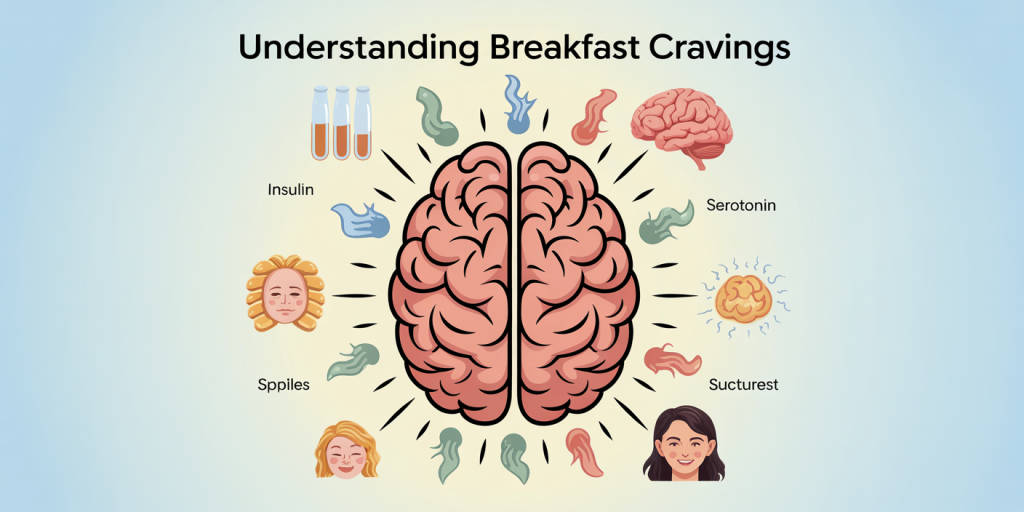Breakfast cravings are more than just a morning whim; they can reveal a lot about your personality, health, and even your lifestyle choices. Whether you wake up reaching for sugary pancakes or crave a salty omelet, these preferences often mirror deeper physiological and psychological factors. This article explores what your breakfast cravings for sweet or savory foods might indicate about your body, mind, and habits, supported by research and real-world examples.
Understanding Breakfast Cravings: More Than Just Hunger
Cravings are complex signals from the brain and body, influenced by hormones, emotions, cultural habits, and nutritional needs. Research by the American Psychological Association suggests that cravings often arise from a combination of physiological needs and psychological triggers. Morning cravings, in particular, set the tone for the day and can have a lasting impact on mood and energy levels.

For example, someone who desires sweet breakfast items like pastries or cereals might be responding to a need for quick energy release. Meanwhile, those opting for savory choices such as eggs or bacon may be looking to satiate a longer-lasting hunger or fulfill protein requirements. Understanding these cravings not only helps in making healthier food selections but also offers insights into individual health dynamics and lifestyle traits.
Sweet Breakfast Cravings: What They Reveal About You
People who crave sweet breakfasts often have a dependence on quick energy boosts. Simple carbohydrates raise blood sugar rapidly, appealing to bodies that need an immediate jolt to start the day. According to a 2020 study published in *Nutrients*, individuals with higher stress levels showed a propensity for sugary foods, likely due to the serotonin-releasing effect sugar provides.
Additionally, a sweet breakfast preference might indicate that your body’s circadian rhythm causes an insulin spike in the morning, leading to a craving for glucose. For instance, Sophia, a 28-year-old graphic designer, noticed she consistently reached for sugary cereals or muffins after waking. After consulting a nutritionist, she learned her habitual late-night snacking caused a morning energy slump, which her body tried to fix through sugar intake.
Sweet breakfasts often appeal to those with traits such as a high need for comfort and reward, as sweet foods generally activate the brain’s pleasure centers. Real-world examples include people working in high-stress environments who use sweet breakfasts as a mood stabilizer, or individuals with busy mornings seeking convenience foods like pastries or smoothie bowls that provide a burst of flavor and energy quickly.
Common Sweet Breakfast Foods: Pancakes with syrup Donuts and muffins Sweetened cereals and granola Yogurt with honey or fruit
Savory Breakfast Cravings: Insights into Your Lifestyle and Health
Savory breakfast cravings tend to reflect a desire for sustained energy and protein intake. Foods rich in protein and fats provide a slower, more stable energy release, which appeals to people engaged in physically or mentally demanding work. Studies have shown that protein consumption in the morning improves cognitive performance and maintains satiety longer, reducing mid-morning snacking tendencies (Source: *Journal of Nutrition*, 2019).
Take, for example, James, a 35-year-old firefighter who always prefers eggs, cheese, and avocado toast for breakfast. His body requires nutrient-dense, satiating foods to support intense physical activity. Similarly, older adults often lean toward savory breakfasts to maintain muscle mass and avoid blood sugar spikes that sugary foods can cause.
Savory breakfasts might also suggest personality traits such as pragmatism and a preference for routine and balance. Those favoring savory items tend to view breakfast as a functional meal mainly for fuel, rather than an opportunity for indulgence.
Common Savory Breakfast Foods: Eggs (boiled, scrambled, omelets) Bacon or sausage Avocado on toast Cheese and vegetable omelets
Psychological and Emotional Dimensions of Breakfast Preferences
Cravings do not just reflect physiology; they are also tied to emotional and psychological states. Sweet food cravings are often linked with positive emotional reinforcement. The consumption of sugar triggers dopamine release in the brain, which creates a temporary “feel-good” effect. This ‘reward mechanism’ has been well documented, especially in individuals prone to anxiety or depression.
On the other hand, savory cravings may be related to comfort found in more substantial and familiar flavors, often rooted in cultural or familial tradition. For instance, a study published in *Appetite* in 2021 found that savory foods are frequently associated with feelings of warmth, reliability, and nourishment that can help reduce stress, particularly in colder climates.
A practical case comes from Lisa, a marketing executive, who stated that she craves sweet breakfast during the workweek for its energizing effect but opts for savory foods on weekends when she feels more relaxed and able to savor her meals. This flexing between sweet and savory shows a dynamic balance influenced by emotional states and life rhythms.
Nutritional Implications: Balancing Sweet and Savory at Breakfast
While it is tempting to choose either sweet or savory based on taste, each type has distinct nutritional impacts that should be considered for healthy eating patterns. Sweet breakfasts, especially when composed of processed sugars, can lead to energy crashes and increased risk of metabolic issues such as insulin resistance and type 2 diabetes (CDC, 2023 data).
Conversely, savory breakfasts often contain more protein and fats that satisfy hunger longer and stabilize blood sugar. However, the high salt or fat content in some savory choices (e.g., bacon or processed meats) can increase cardiovascular risks if consumed excessively.
| Aspect | Sweet Breakfast | Savory Breakfast |
|---|---|---|
| Primary Nutrients | Simple carbohydrates, sugars | Proteins, fats, complex carbs |
| Typical Energy Impact | Quick spike and crash | Slow and sustained energy release |
| Common Health Risks | Blood sugar fluctuations, weight gain | High sodium, saturated fats |
| Mood Effects | Temporary dopamine boost | Prolonged satiety and stability |
| Example Foods | Pastries, cereals, yogurt with honey | Eggs, avocado toast, cheese |
Balancing sweet and savory elements — such as pairing fruit with eggs or adding avocado to a waffle — can optimize nutrient intake and satisfy cravings healthily. Dietitians often recommend such combinations to patients aiming to support energy management and overall well-being.

Cultural and Lifestyle Influences on Breakfast Preferences
Cultural background plays a significant role in shaping breakfast cravings. In the US, sweet breakfasts such as pancakes and cereals dominate, while many Mediterranean cultures emphasize savory options like olives, cheeses, and vegetables. Asian breakfasts often blend sweet and savory in unique ways, with congee or miso soup examples.

These cultural norms influence individual cravings and habits through upbringing and societal food environment. A practical example can be seen in immigrant populations adapting to new food contexts, where cravings may shift over time. For example, an Indian immigrant family might traditionally start with savory items like idlis, but children raised in Western countries often prefer sweeter cereals or pastries.
Lifestyle factors like work schedules, physical activity, and stress also affect breakfast choices. Shift workers may crave sugary or energy-dense foods to counter fatigue, while active individuals often require savory, protein-rich meals that support endurance.
Evolving Breakfast Trends and Future Perspectives
Breakfast habits are evolving globally, influenced by health trends, technological advancements, and changing work patterns such as remote work. The rise of functional foods and personalized nutrition is shaping how people respond to their breakfast cravings today.
For instance, wearable health trackers and apps now allow users to monitor blood sugar responses to meals, enabling more informed choices between sweet and savory options. Plant-based alternatives are also influencing cravings, with more savory vegan breakfast options becoming available and sweet breakfasts integrating superfoods and low-glycemic ingredients.
Looking ahead, breakfast preferences might increasingly reflect an individualized approach blending genetic information, lifestyle data, and psychological profiles, offering tailored advice that balances cravings with optimal health outcomes. This could mean a future where your morning meal is no longer a guess based on habit but a scientifically optimized experience that supports your unique biology and mental health.

Deixe um comentário